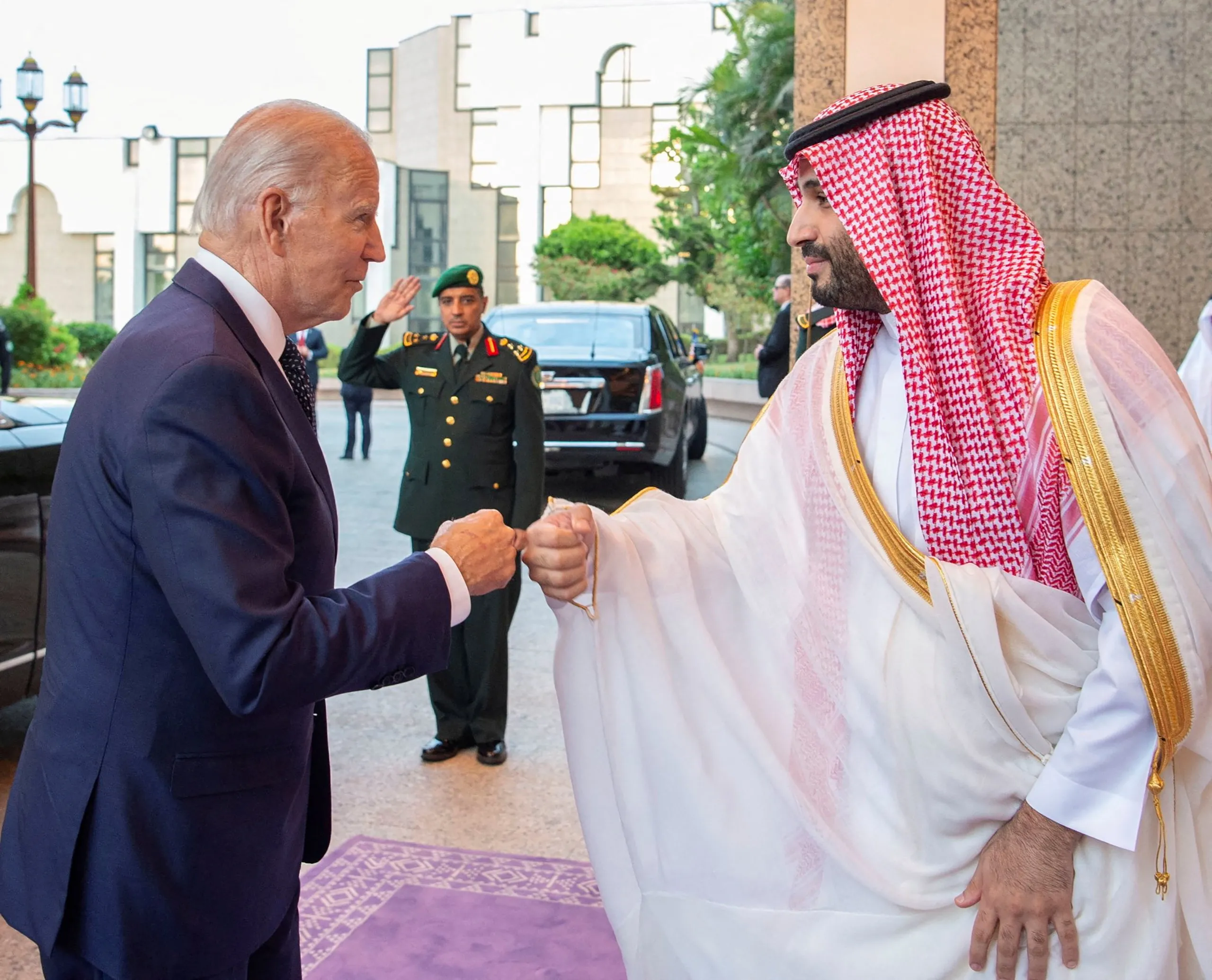The president of the United States prioritized mending his country’s relationships with long-standing regional allies while simultaneously trying to reshape the future of US regional cooperation
President Joe Biden’s Middle East trip, which included visits to Israel and Saudi Arabia and a meeting with nine Arab leaders in Riyadh, came at a crucial moment for the region because of domestic pressure over high energy prices and his willingness to compromise morality for the sake of national security. The US president’s attempt at a reset of relations serves as a backdrop for his initiatives to control geopolitical rivalry in the Middle East, support increased regional security cooperation, and manage tensions with Iran—all of which are advantageous to the US’s allies in Britain and Europe.
Washington’s plan to resurrect the Iran nuclear deal, known as the Joint Comprehensive Plan of Action (JCPOA), has long been a source of regional anxiety. Other issues include the detour caused by US domestic politics and geopolitical maneuvering. The failed US pullout from Afghanistan and the lack of response from the US government to repeated drone and missile assaults, sponsored by the Houthis and resulting from the Yemeni conflict, that targeted Saudi Arabia and Abu Dhabi in January only served to exacerbate these feelings.
Biden’s transformation
Following the Trump administration’s cordial welcome of these states, Biden vowed to protect human rights concerns in the area and had previously declined to speak with Saudi Crown Prince Muhammad Bin Salman (MBS) regarding his role in the assassination of writer Jamal Khashoggi in Istanbul.
During this trip, Biden made a controversial fist bump with MBS, demonstrating his willingness to offer a practical course correction that will eventually enable the US to once again have a positive effect.
However, the Russian invasion of Ukraine served as a trigger for irritated American allies like Saudi Arabia, Israel, and the United Arab Emirates (UAE) to publicly air their growing complaints against Washington by declining to initially denounce Russian aggression, adopting a neutral war stance, and sticking to their current OPEC+ output agreements. Hence, although primarily focused on geopolitical regional dynamics, Biden’s contentious fist-bumping with MBS during this trip reflects his willingness to offer a practical course correction that will, over time, allow the US to once again have a constructive influence on important issues in the region like human rights and social development.
The main topic of discussion was Iran’s role in the area and its expanding nuclear program, which is the main cause of regional instability. The Biden administration’s attempts to resurrect the JCPOA following Donald Trump’s 2018 departure had long been met with resistance from regional powers. Tehran’s program has developed rapidly since 2019 and without sufficient IAEA oversight; yet, talks that have been going on since April 2021 have not yet resulted in a deal. States in the area would prefer to see maximum pressure sanctions imposed in order to restrain Tehran’s disruptive operations because the JCPOA only addresses Iran’s nuclear program and does not restrict Iran’s support for and transfer of deadly aid to proxy organizations in Yemen, Syria, Iraq, and Lebanon.
President Biden took a strong stand to defend Israel by signing a joint declaration to “never allow Iran to acquire a nuclear weapon,” with the US promising to “use all elements of its national power to ensure that outcome.” This was done in the absence of any “plan B” to manage Iran’s nuclear acceleration or to stop a cycle of impending escalation. Iranian drones and missiles are among the common security issues that are bringing people together to support regional security cooperation. The normalization agreements between the UAE and Bahrain and Israel, known as the September 2020 Abraham Accords, are currently laying the groundwork for more extensive regional multilateral coordination.
Building on this, Biden has taken the initial steps to foster more formal Israeli-Saudi public engagement that leads to normalized ties. The US and regional states intend to organize a regional air defense network to facilitate this collaboration. The US has become more worried about China’s geopolitical and economic might in the Middle East, but it has not been able to effectively challenge China with alternatives.
Being the first US president to travel directly from Tel Aviv to Riyadh, Biden was made possible by the Kingdom’s announcement that it would be opening its airspace to all airlines. Furthermore, Israel must continue to be able to freely cross the Straits of Tiran in order to retain Saudi control over the Red Sea islands. Additionally, rather than passing through Jordan, Israeli Muslims are anticipated to be able to make the hajj straight to Saudi Arabia. It will undoubtedly take a while to establish this air defense integration plan, especially in a region where confidence is low and conflicts abound. However, Washington believes that supporting this endeavor will strengthen demands for burden sharing, capacity building, and regional security. Significant backing for the Palestinians and the two-state solution was conspicuously lacking and continues to be missing in the Presidents agenda.
Can the US stave off China’s expanding power?
The Biden administration is engaging in a more prolonged geopolitical game of strategy by offering more promises and backing on a regional level. Though it has not been successful in offering alternatives to China, the US is growing more concerned about China’s geopolitical and economic might in the Middle East. Beijing maintains lower level strategic partnerships with nine other regional states and has comprehensive strategic partnerships with Saudi Arabia, the UAE, Egypt, Algeria, and Iran. As the main oil supplier to Beijing, Riyadh has established robust commercial energy connections with China, benefiting the GCC states.
Fed up with Washington, Riyadh has looked to Beijing to strengthen its own missile program, and there are rumors that the UAE gave China permission to construct a covert dock. Additionally, Washington noted that there are security dangers for mobile infrastructure associated with Huawei’s 5G network.
At the conference in Riyadh, Biden made it clear that the US “will not walk away and leave a vacuum to be filled by China, Russia, or Iran.” He also announced a cooperative plan to develop a 5G/6G network and to allocate funds for cybersecurity, clean energy, and space research in addition to climate security. To offer a longer-term counterbalance to China’s regional advance, he also pledged to keep up human rights conversations. When combined, these steps offer the states in the region a strong set of assurances. President Biden is right to play the long game given the new security alignments now in place in the Middle East, the impending tensions with Iran, and the competitive geopolitical factors at play in the area.
Because of this, American support for the security of the states in the region has to be redoubled. Regional integration and capacity-building through ongoing bilateral and multilateral engagement are essential to the national security objectives of the US and the Middle Eastern states.










